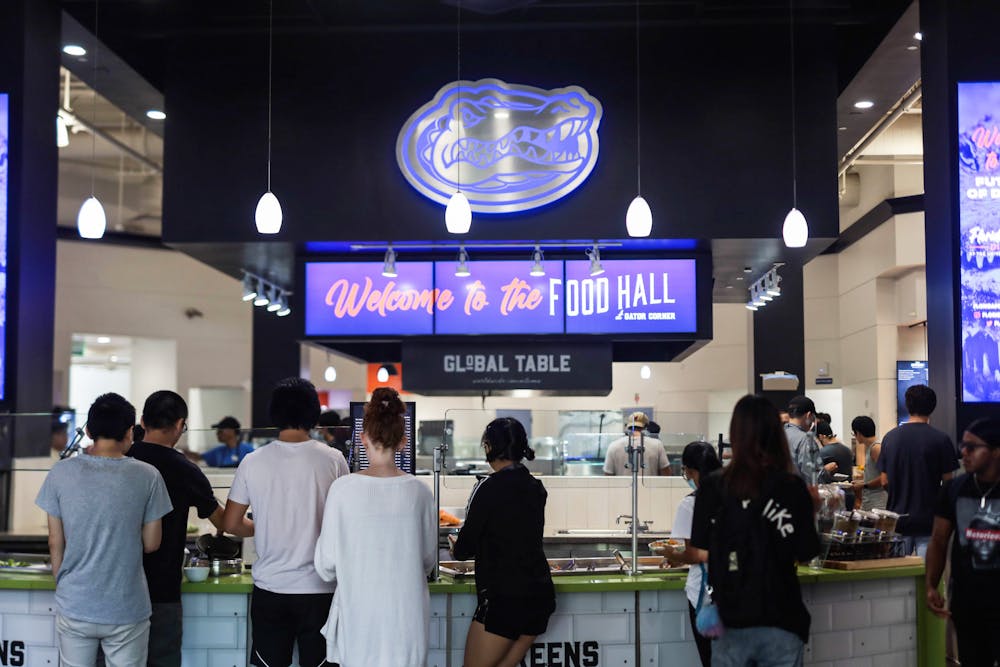The atmosphere of a collegiate dining hall has remained the same for decades: teeming with eaters and full of ever-changing food options. For students at UF, the latter is now especially true.
UF Business Services announced its split from Aramark in May, choosing to end a 13-year contract with the food service company to partner with Chartwells Higher Education — the provider now spearheading dining throughout campus.
Almost halfway through the semester, students with meal plans have had the chance to taste their way through many of Chartwells’ food initiatives — leaving some happier than others.
UF’s previous food service contract was due to expire June 30, 2022, Brandi Renton, UF’s associate vice president of business affairs, wrote in an email. The introduction of Chartwells’ services on campus began shortly before this contractual termination June 18.
Chartwells has brought a series of developments to campus, with local restaurants playing a large role in their plan for UF. Spots like SweetBerries Eatery & Frozen Custard and Opus Coffee have made UF’s campus their new homes — a change that aligns with Chartwells’ approach to university dining, while allowing them to offer students familiar foods through traditional dining halls.
For some UF students, the university's separation from Aramark was representative of the goals they’d been fighting to achieve for a while.
The Food Justice Coalition, composed of different Gainesville-based organizations and UF students, advocated for a food provider with better practices. It formed in January of last year, with members being openly critical of Aramark's connection to wage violations and prison labor.
Aramark has operated in American prisons since 1976, through subsidiary company Aramark Correctional Services. The largest food service provider to U.S. prisons, it has gained notoriety for serving American inmates with inadequate food and violating several safety and health-based policies in correctional facilities — while simultaneously being accused of exploitation for not compensating the inmates who have worked under its management.
Coalition members like Leah Cohen, coordinator at the Agricultural Justice Project, consider this recent food service switch a victory. As UF dissolved its ties to Aramark and settles in with Chartwells, the association celebrated its progress.
“That was a win for the campaign,” Cohen said. “We’re excited to partner with Chartwells and be on campus.”
However, views on this change haven’t been uniform. On campus, students’ opinions vary as to whether Chartwells’ food and services have topped Aramark’s. To Jacob Aronovitz, a 19-year-old UF nursing sophomore, dining hall food still lives up to a not-so-great reputation.
“I mean, food is food,” Aronovitz said. “It’s not the greatest stuff. But I’m happy with it.”
Food for the Gator Good, Chartwells’ lookbook for UF, details a central focus of its mission: a culinary commitment to providing inclusive food options that accommodate halal, kosher, vegan and vegetarian diets. Some students like Micheala Vollmer, an 18-year-old UF applied physiology and kinesiology freshman who eats a vegetarian diet, have seen the benefits of the dining halls serving different meal options.
“They would implement a lot of tofu into the meals, which was good,” Vollmer said. “In Broward, specifically, they had vegan eggs and vegan sausage — it was good that they offered it.”
But soon after, Chartwells’ inclusive options became repetitive, Vollmer said. She had a meal plan during the Summer B term, but she opted not to renew her subscription this Fall.
“I was mainly eating a lot of yogurt and cheese pizza every day,” she said. “It was stuff I got really tired of.”
Since its introduction to UF this summer, Chartwells has begun incorporating its philosophy into the student dining experience — most notably through the Florida Fresh Dining program, Renton said.
“Food-forward and people first is the approach,” Renton wrote. “The brand has engaged the campus community through innovative cuisine and quality service.”
Students should have the opportunity to choose from rotating meals and desserts, according to a document that features Chartwells’ menus for UF, obtained by Food Justice Coalition members and shared with The Alligator.
Chartwells’ plan for UF also incorporates the inclusion of local restaurants. UF Business Services detailed this vision, saying its focus on local partnership and purchasing will allow Chartwells to “engage the campus community” through innovative cuisine and quality service.
Chartwells recently collaborated with Plantology, a vegan restaurant based in Gainesville, to bring plant-based food to students at UF. As indicated in a recent Instagram post, the restaurant will be serving lunch at the Reitz Union for one week each month, beginning Sept. 27 and finishing near the close of the Fall semester Dec. 9.
Ryan Strandjord, the 38-year-old owner of Plantology, said it’ll be easier for students to get to Plantology now that it’s on campus. The business primarily operates out of a food truck in Midpoint Park and Eatery in the Innovation District.
“It can be kind of difficult for people to find vegan food on campus at UF,” Strandjord said. “So for us to be there to provide those options is really important.”
With local favorite SweetBerries Eatery and Frozen Custard being brought to Newell Hall, many are beginning to view Chartwells new, on-campus dining initiatives in a better light.
Chloe Glaum, a 22-year-old UF aerospace engineering senior, said she loves seeing UF collaborate with local restaurants.
“I think it’s nice that they have local spots on campus — the food feels like it’s a lot less greasy and processed,” Glaum said. “The workers also seem a lot happier about being at their job. It just feels like a better experience.”
Chartwells’ UF lookbook also includes the implementation of technology, like adding kiosks and mobile ordering for efficiency.
But some UF students have reported having unsatisfactory encounters with these technologies.
Ginny Rowe, a 19-year-old UF mechanical and aerospace engineering sophomore, said she had issues using her meal plan at The Hub’s Chick-fil-A kiosk.
“When I swiped my card, it wouldn’t go through,” Rowe said. “I had to get assistance from one of the cashiers.”
For Chartwells, the incorporation of technology into on-campus restaurants only represents a sliver of their vision for change at UF. The company has brought a slew of new food-based initiatives to campus, aiming to transform dining for the UF community altogether.
While students haven’t considered it a perfect transition, many look forward to how food services may continue to grow and improve under the new provider.
Contact Halima at hattah@alligator.org Follow her on Twitter @HalimaAttah.
This article has been updated to remove an incorrect section about Chartwells' contract with New York University. The Alligator originally reported otherwise.

Halima Attah is a first-year journalism student and university reporter for The Alligator. When she’s not writing, you can probably find her thrifting on Depop or listening to her carefully curated Spotify playlists.






